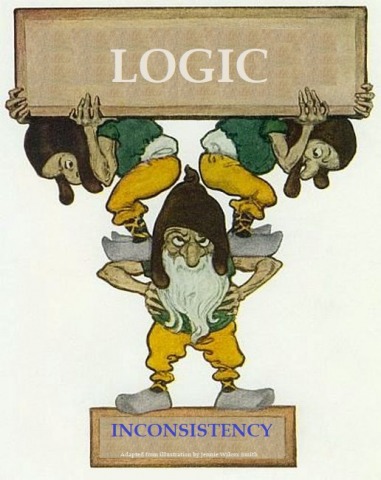
In a previous post I commented on the attack on Aristotle’s Law of Excluded Middle – that a meaningful statement is either true or false, with no in-between. Today I’d like to comment on the related attack on his Law of Non-Contradiction, that no meaningful statement can be both true and false, in the same sense, at the same time. At stake is whether reality can be inconsistent.
Some claim that the possibility of inconsistent realities is proven by Schrödinger’s cat. I am referring to a famous thought experiment in physics, in which a cat is locked in a box with a tiny bit of radioactive matter, along with a vial of poison gas, connected via a relay with a Geiger counter. If a radioactive nucleus decays, the vial of gas is shattered and the cat dies. If it doesn’t decay, no gas is released and the cat lives. The claim of the contradiction-mongers is that until the box is opened and the condition of the cat is observed, the cat is both dead and not dead.
No: Until the box is opened and the condition of the cat is observed, we simply don’t know whether it is dead or not dead. True, the possibility that the cat is dead coexists with the possibility that it is not dead, but this in no way suggests that the dead cat coexists with the live cat. It turns out that this was Schrödinger’s own view too! Although the predictions of quantum theory have proven highly accurate, the notion that they show that the principle of non-contradiction can be violated is nonsense. Unfortunately, the more outré interpretations of what is going on with the cat receive more attention from science popularizers than the sensible interpretations do.
If we understand truth as correspondence – if the thought expressed by the proposition “Snow is white” is true if, and only if, snow is white in reality – then it is difficult to imagine what anyone who says “Snow is white, and also snow is not white” thinks he is asserting. In fact, the statement that propositions can be both true and false would itself be both true and false. What is one to make of that?
Moreover, it has been known for centuries that from a contradiction, literally anything can be shown to follow. For example, if snow is white, and also snow is not white, then it follows that God exists. And that fairies like ice cream. And that God doesn’t exist. And that fairies don’t eat at all. And that it isn’t true that snow is white. All possible inferences can be made. This calamitous result is sometimes called “explosion.” Given the principle of explosion, it would seem that whenever there is an inconsistency in a system of propositions, the game is up.
But can we give up the game so easily? Sometimes, when we are dealing with enormous systems of propositions, we know that there are probably some inconsistencies in there – and we will try to get rid of them when we discover them – but in the meantime, we don’t know what they are.
This being the case, it might be helpful to develop a way to insulate the rest of the system from so-far-undiscovered inconsistencies – to cautiously keep using the system while we are trying to find them and root them out. This is something like what computer programmers do when they try to develop programs that won’t crash every time, even though the programs inevitably still contain some bugs.
Now some people who talk about such “paraconsistent” logics speak as though they thought a proposition really could be both true and false in the same sense at the same time – which requires believing that a thing can both be and not be in the same sense at the same time. This is called dialetheism, and to call it “badly confused” seems generous.
But sometimes people who talk about paraconsistent logics speak more as though they are trying to develop coping strategies of the sort that I mentioned in computer programming. Their thought is merely that we may have to tolerate contradictions provisionally, while we are trying to find out what they are. This may not be insane, and may even be important -- although perhaps it is misleading to call the development of coping strategies “logic.” It might be more accurate to say that the goal is to protect logic from the illogic we haven’t yet caught.
Copyright © 2023 J. Budziszewski